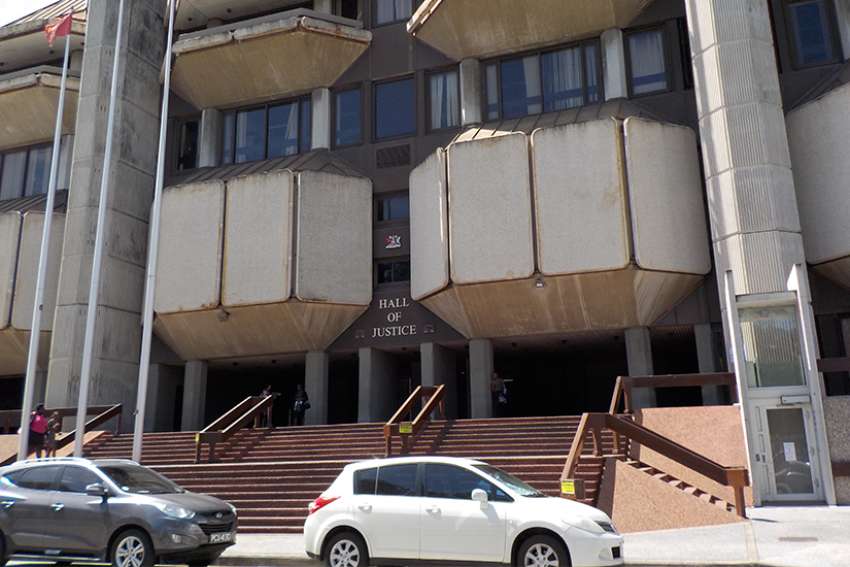04.17.2018 The Trinidad and Tobago Hall of Justice, where the High Court sits, is seen April 13 in Port-of-Spain. The Catholic Church in Trinidad and Tobago has declared its support for an April 12 High Court decision that paved the way for making sodomy legal in that country.
CNS photo/Laura Ann Phillips
Church supports move to legalize sodomy in Trinidad and Tobago
By Catholic News Service
PORT-OF-SPAIN, Trinidad – The Catholic Church in Trinidad and Tobago has declared its full support for an April 12 High Court decision that paved the way for making sodomy legal in that country.
At this time, it is still a criminal offense that carries a prison sentence of 25 years.
In an April 13 statement, Archbishop Charles Gordon of Port-of-Spain said, "Buggery is a serious moral offense, but it should not put someone in prison for 25 years."
Archbishop Gordon cited the Vatican's December 2008 intervention made at the 63rd Session of the United Nations: "The Holy See continues to advocate that every sign of unjust discrimination toward homosexual persons should be avoided and urges states to do away with criminal penalties against them."
Most of Trinidad and Tobago's legislation is inherited from its pre-independence days as a British colony, including the "Buggery Laws" -- a reference to laws governing sodomy. The Sexual Offences Act of 1987 still contains statutes from the English Buggery Act 1533.
The Sexual Offences Act does not apply to, "an act of serious indecency committed in private between a husband and his wife" or "a male person and a female person, each of whom is 16 years of age or more, both of whom consent to the commission of the act."
"It's really discriminatory, when you think about it," said Father Martin Sirju, vicar general of the Archdiocese of Port-of-Spain, "because there are heterosexual people who practice this sexual expression, and they are not the ones being targeted in this. It's just one group."
And, of that group, it was still the relatively powerless who would likely suffer, "because the one who gets exposed, let's face it, is the underdog," added Father Sirju. "Those are the ones who get exposed, not the privileged, not the well-placed people."
Archbishop Gordon said he knew people believed that repealing the laws "will open the door to same-sex marriage."
"These may well be strategies that are tied together. We need to deal with them separately," he said, adding, "We will oppose same-sex marriage in every way possible."
He reminded the faithful, however, that: "Mercy is the epicenter of the Gospel message. Homosexuals should be protected, and we should ensure that they are not subjected to discrimination or violence.
"They should be accepted with respect, compassion and sensitivity."
In his ruling, Justice Devindra Rampersad called the laws "unconstitutional," adding that: "This court must and will uphold the constitution to recognize the dignity of even one citizen whose rights and freedoms have been invalidly taken away."
The decision comes at a time when many are fearful that a wider LGBTQ agenda may be taking root in the Caribbean.
Trinidad-born LGBTQ activist Jason Jones, who brought the case contesting the law, told local media he intended to continue the fight for LGBTQ rights to same-sex marriage and adoption.
In 2015, Jamaican lawyer Maurice Tomlinson brought a case at the Caribbean Court of Justice challenging the immigration laws of Trinidad and Tobago and Belize, which denied entry to homosexuals.
The case was thrown out when it was proved that Belize prohibited anyone, homosexual or otherwise, entering the country as sex workers or intending to profit from such gains, and that Trinidad and Tobago's Immigration Department "does not apply this prohibition to homosexual CARICOM neighbors," so, as a national of a member country of the Caribbean Community (CARICOM), Tomlinson would not be denied entry.
The following year, the Belize Supreme Court legalized sodomy after Belizean activist Caleb Orozco challenged the Criminal Code. The local Catholic Church had supported keeping the act illegal.
Addressing religion-based objections to changes in the law, Rampersad stated: "This conclusion is not an assessment of denial of the religious beliefs of anyone. ... However, this conclusion is a recognition that the belief of some, by definition, is not the belief of all and, in the Republic of Trinidad and Tobago, all are protected, and are entitled to be protected, under the constitution."
In the days preceding the Trinidad and Tobago case, religious and secular groups marched through the streets of the capital voicing their concern. Following the decision, they declared their intention to continue protesting in various ways until the matter is recalled July 4, when the court is expected to make recommendations on attorneys' submissions on how to proceed.
The Trinidad and Tobago government has declared its intention to appeal the ruling; the matter is expected to be eventually heard in the U.K.-based Privy Council, the highest court in the country.
Please support The Catholic Register
Unlike many media companies, The Catholic Register has never charged readers for access to the news and information on our website. We want to keep our award-winning journalism as widely available as possible. But we need your help.
For more than 125 years, The Register has been a trusted source of faith-based journalism. By making even a small donation you help ensure our future as an important voice in the Catholic Church. If you support the mission of Catholic journalism, please donate today. Thank you.
DONATE

